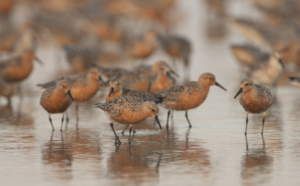Thank you to everyone who attended our screening of Scarlet Sky and Blue Blood: Conservation of the Red Knot and Horseshoe Crab in the Southeastern US earlier this week in partnership with Southern Environmental Law Center. We were inspired by audience support and the stunning footage documenting the rare sight of red knots and horseshoe crabs in South Carolina.
Riley Egger, Land, Water & Wildlife Program Director has answered your audience questions below!
Red knots on South Carolina beaches / Benjamin Clock
What impact do you hope this documentary has on those who view it?
Scarlett Sky and Blue Blood is a visually stunning and powerful film by documentarian Ben Clock. I hope that people walk away feeling inspired by our efforts and those across the Southeast, but also feel a sense of urgency for the imperiled red knot.
We know South Carolina is special – our sandy beaches, vast salt marsh, and closeness to wildlife-rich waters are some of the reasons people gravitate towards South Carolina. I hope this film helps viewers grasp not only how special our shores are for wildlife like horseshoe crabs and red knots, but the global significance our coast plays in the survival of these species.
I hope viewers walk away feeling a sense of awe, urgency, and hope. Awe of the majesty and determination of these federally threatened birds, an urgency to protect their vital food source and the habitat they rely on, and hope for what’s to come next for these two species.
Last year, the Conservation League and our partners reached a major legal victory that secured necessary protections for the rufa red knot, including safeguarding over 30 beaches and Cape Romain National Wildlife Refuge. Wildlife populations are notoriously slow to recover, and it will take time to see the full scope of our impact, but the on-the-ground observations from birders and biologists are promising.
Are horseshoe crabs being harvested in Delaware Bay?
Yes. However, unlike South Carolina, horseshoe crabs can be harvested using trawls and dredges. In the Delaware Bay region, harvesting horseshoe crabs for use as bait is still largely allowed, while it’s prohibited in South Carolina.
For the last 10 years, the Atlantic State Marine Fisheries Commission (ASMFC), the federal regulatory that oversees the commercial harvest of horseshoe crabs, has prohibited the harvesting of females. However, for the past two years, they have considered proposals to allow for the bait harvest of 175,000 female crabs. Ultimately, they have denied the proposals after mass concern by conservations and scientists.
What is the status of Deveaux Bank? What effect has erosion had on this seabird sanctuary?
Deveaux Bank boasts international importance as a refuge for migratory birds. In 2019, researchers discovered Deveaux Bank is the world’s largest known roost site for whimbrel, supporting 20,000 birds — half of the entire East Coast population. Deveaux Bank also supports one of the largest roosts in the Southeast for federally threatened red knots.
Like a lot of our coast, Deveaux Bank has experienced severe erosion from winter storms, leaving only a quarter of high ground available compared to last year. Despite its importance and fragility, SCDNR has historically allowed public access to Deveaux Bank year-round, including nesting season, and was the only Seabird Sanctuary to allow so for years.
However, earlier this year, SCDNR announced a complete temporary closure of Deveaux Bank during nesting season, bringing Deveaux Bank in line with the protections afforded to our other seabird sanctuaries, like Bird Key and Crab Bank.
How do I get involved in horseshoe crab conservation?
You can help track where horseshoe crab spawning is occurring to the SCDNR.
If the weather is rough, a horseshoe crab may get flipped over, and it may be difficult for them to right themselves. If you ever come across a stranded horseshoe crab that’s upside down, grasp both sides of the shell pick up the animal and set it down with its legs in the sand. It’s important to never pick a horseshoe up by its tail, known as a telson.
In case you missed it…
We hosted a film screening of Benjamin Clock’s powerful new documentary Scarlet Sky and Blue Blood: Conservation of the Red Knot and Horseshoe Crab in the Southeastern US with Southern Environmental Law Center on Tuesday, June 25th.
A special thanks to our moderator and Executive Director of Audubon South Carolina, Rebecca Haynes, and our panelists for sharing their expertise and stories from the long journey of protecting these two special species in South Carolina.
Catherine Wannamaker, Senior Attorney for the Southern Environmental Law Center, detailed the pathway of litigation and the hard-fought win in the court room against the invasion of biomedical company Charles River Laboratories.
Riley Egger, Land, Water & Wildlife Program Director for Coastal Conservation League, illuminated the threats migratory shorebirds face on their impressively long flights, and how we can minimize our anthropogenic disturbance when they land on our coastline.
And of course, Benjamin Clock, filmmaker and documentarian, shared his unique perspective as a biologist and approach to visually telling powerful conservation stories. You can follow and support more of Ben’s work here.
Thank you to the Queen Street Playhouse for hosting us in their theater for the screening!
So what’s next? As we hope to see these species populations begin to recover in South Carolina, we can each do our part to promote responsible shorebird stewardship.
As Riley said Tuesday night, it’s tough being a bird, y’all!
You can help track the abundance of the vital food source for red knots by reporting any horseshoe crab sightings to South Carolina Department of Natural Resources.
We’ve answered your questions from Tuesday night here.
For more coastal bird updates and conservation news, sign up to receive emails from Coastal Conservation League and Southern Environmental Law Center.

